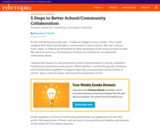
5 Steps to Better School/Community Collaboration
Simple ideas for creating a stronger network
By Brendan O'Keefe
- Subject:
- Education
- Material Type:
- Primary Source
- Author:
- Brendan O'Keefe
- Date Added:
- 12/20/2018

5 Steps to Better School/Community Collaboration
Simple ideas for creating a stronger network
By Brendan O'Keefe
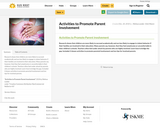
Research shows that children are more likely to succeed academically and are less likely to engage in violent behavior if their families are involved in their education. Many parents say, however, that they feel unwelcome or uncomfortable in their children's schools. Teachers often feel under attack by parents who are highly involved. Learn how to bridge the gap. Included: A dozen activities to promote parental involvement and ten tips for involved parents.
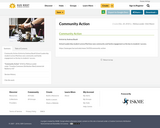
Community Action
Article by Andrew Bauld
School Leadership student Lorena Martinez sees community and family engagement as the key to students' success.
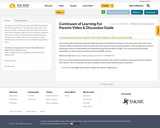
This amazing video will clearly explain the PeBL philosophy at Sun West School Division. The who, what, when, where, why and how of PeBL are addressed and articluated clearly for the parent and community audience. Topics include the continuum of learning, transfer of responsibility, personalized learning, the three pillars of PeBL. This resource will clearly explain everything you need to know to get started embracing PeBL at home!

This is a collection of tools to assess the effectiveness of family engagement in a school's learning community.
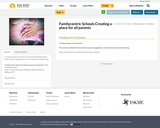
Creating a place for all parents.
This article by Debbie Pushor looks at parent engagement, school community and well-being.

Please find the required PowerPoint presentation below. This workshop has been developed as part of the course Parents in Teaching and Learning (ECUR 823) at the University of Saskatchewan with professor Debbie Pushor.This workshop is meant to be personalized. Select the activities you wish to discuss, and spend as much or as little time on the concepts that speak fully to your school. As you select activities and where to put your focus think of what needs to be done as a school and as a classroom teacher before school begins, during school, and over the summer. Pick and choose the activities that best fit your school and your school’s needs.If you have any questions, feedback, or require clarification please feel free to call or email Melissa.lander@sunwestsd.ca.

Next Steps
What is Parent Engagement
Why is Parent Engagement Important
Parent engagement activities
Planning Parent Engagement Toolkit (external link)
“Hospitality and invitation remain empty gestures until they are made with the genuine intention to open up the school space and agenda, to co-create it with parents and other caregivers as well as with students” - from Parent Engagement: Creating a Shared World (external PDF) by Debbie Pushor, PhD
Parent engagement increases student achievement and fosters positive learning outcomes. To increase parent engagement in your school, follow these simple steps to get started:
Assess:
Parent engagement checklist
Getting started:
How to make parent engagement “come alive”
Increasing involvement:
Barriers and strategies for success

Table of Contents
I. Toolkit Overview Pg. 2
• Purpose of the Toolkit
• How to Use the Toolkit
II. Background Pg. 3
• What is Parent Engagement?
• Why is it important?
• What do we mean by sustainability?
• What will success look like?
III. Sustaining and Improving Parent Engagement Pg. 4-6
• How did this effort come about?
• What does experience tell us about the importance of each strategy?
IV. Achieving Success: Guide for Creating Your Own Strategies Pg. 7-17
• Creating a Parent Engagement Roadmap
• Developing a Parent Engagement Checklist/Self Assessment
• Establishing a Parent Engagement Support Network
V. Source Material & Additional Resources Pg. 18

"Want to help kids understand the magic of machine learning? In this lesson students will learn how machine learning algorithms work, and their uses in day-to-day life!"
A simple introduction to learning like a computer - no devices required.
The lesson is divided into:
Prep Work
Lesson
Assessment
Extensions
Curricular Connections
References

Parents matter in education. They matter as vital partners who contribute much to the work of our educators, schools, and communities. They matter as parent leaders, parent mentors, and models of commitment to excellent in education, and they matter everyday as they influence and support their children’s academic
achievement. (From the included document)

Top Five Reasons to Engage Parents
1. Decades of research show when parents are involved students have:
- Higher grades, test scores, and graduation rates
- Better school attendance
- Increased motivation, better self-esteem
- Lower rates of suspension
- Decreased use of drugs and alcohol
- Fewer instances of violent behavior
National Parent Teacher Association
2. Family participation in education is twice as predictive of students’ academic success as family socioeconomic status. Some of the more intensive programs had effects that were 10 times greater than other factors. Walberg (1984) in his review of 29 studies of school–parent programs.
3. School Benefits:
- Improves teacher morale
- Higher ratings of teachers by parents
- More support from families
- Higher student achievement
- Better reputations in the community
A New Generation of Evidence: The Family is Critical to Student Achievement, edited by Anne T. Henderson and Nancy Berla, Center for Law and Education, Washington, D.C., 1994 (third printing, 1996)
4. Parent involvement leads to feelings of ownership, resulting in increased support of schools. Davies, Don. (1988). Low Income Parents and the Schools: A Research Report and a Plan for Action. Equity and Choice 4,3 (Spring): 51-57. EJ 374 512.
5. Parents express a genuine and deep-seated desire to help their children succeed academically, regardless of differences in socioeconomic status, race, ethnicity, and cultural background. Mapp (1999)

"This seven part video series on parent engagement, explains how important it is for educators and parents to engage well with one another to enhance educational outcomes for our young children.This video series is supported by the provincial Early Years Outcome Team and the Ministry of Education."

Who should use this document?
Schools interested in improving student achievement.
What is the purpose of this document?
To help you understand if you are moving toward best practice in parent engagement.
Specifically this tool is designed to help your school begin a conversation about
environment and how welcome people feel in your building. This initial conversation will
start you on your way to continued conversations about honoring and connecting with
parents in ways which support student achievement.
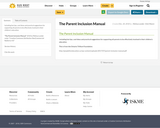
Including hot tips, cool ideas and practical suggestions for supporting all parents to be effectively involved in their children’s education.
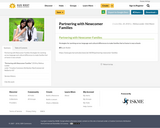
Partnering with Newcomer Families
Strategies for working across language and cultural differences to make families feel at home in new schools

When parents are engaged in their child’s learning, students do better in school and everyone benefits. Parents find it easier to help their child learn. Teachers and principals are better supported and enjoy positive relationships with parents. Students improve, classrooms improve, schools improve and the entire community benefits.

PreK-12 Education, Early Learning and Schools
"Play. Learn. Grow. Together!" is a way to reach out to parents of newborn and Kindergarten-aged children with tips and information on how to help them learn at home.
Play. Learn. Grow. Together! debuts with a new website, interactive social media presence and series of informational videos to get parents thinking about simple and easy ways they can interact with their young child to assist in their development and education. Additional tips and videos from our team of early learning experts will be added over time, allowing Play. Learn. Grow. Together! to evolve into a long term, reliable source of early years educational advice."

Resources are available for:
*Homework and learning with technology
*Online privacy and safety
*Social media and devices
*Cyberbullying
*Media balance and well-being
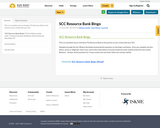
This is an excellent way to introduce The Resource Bank to the parents at your school with your SCC.